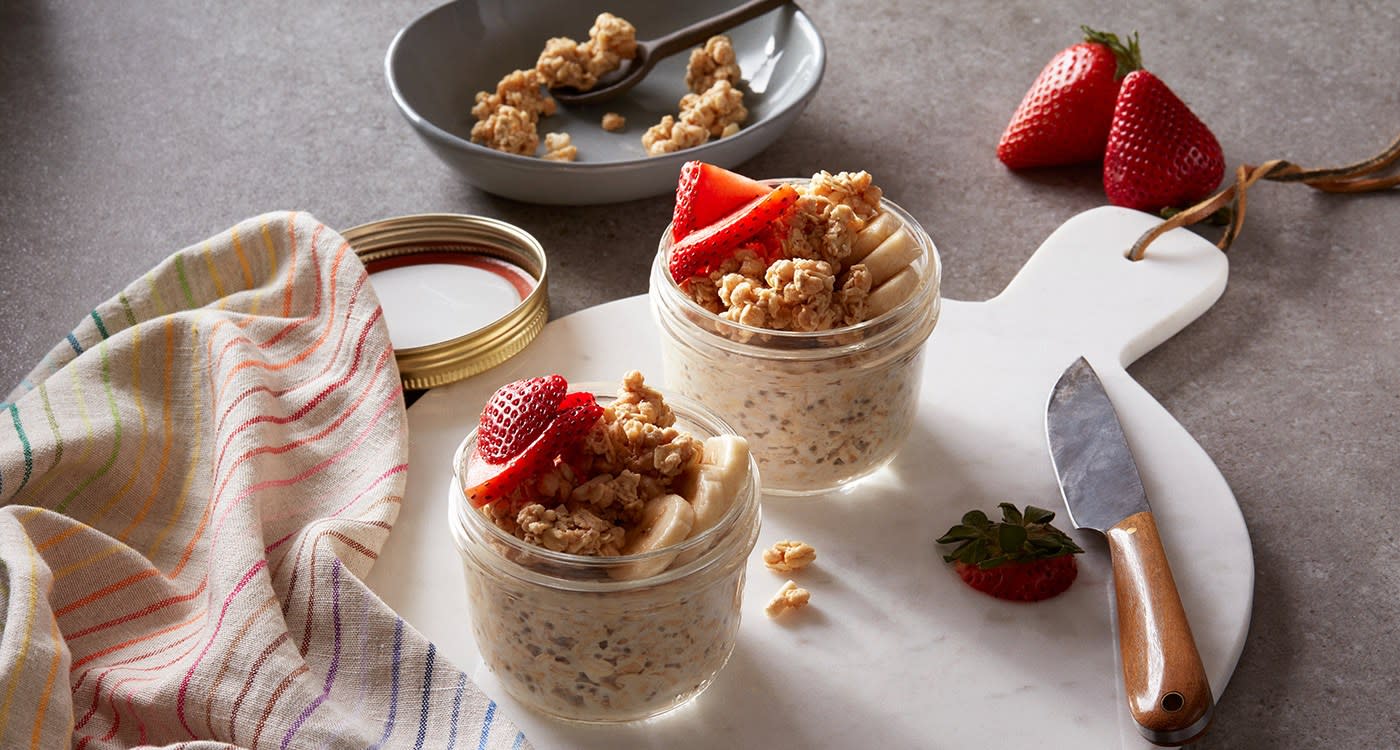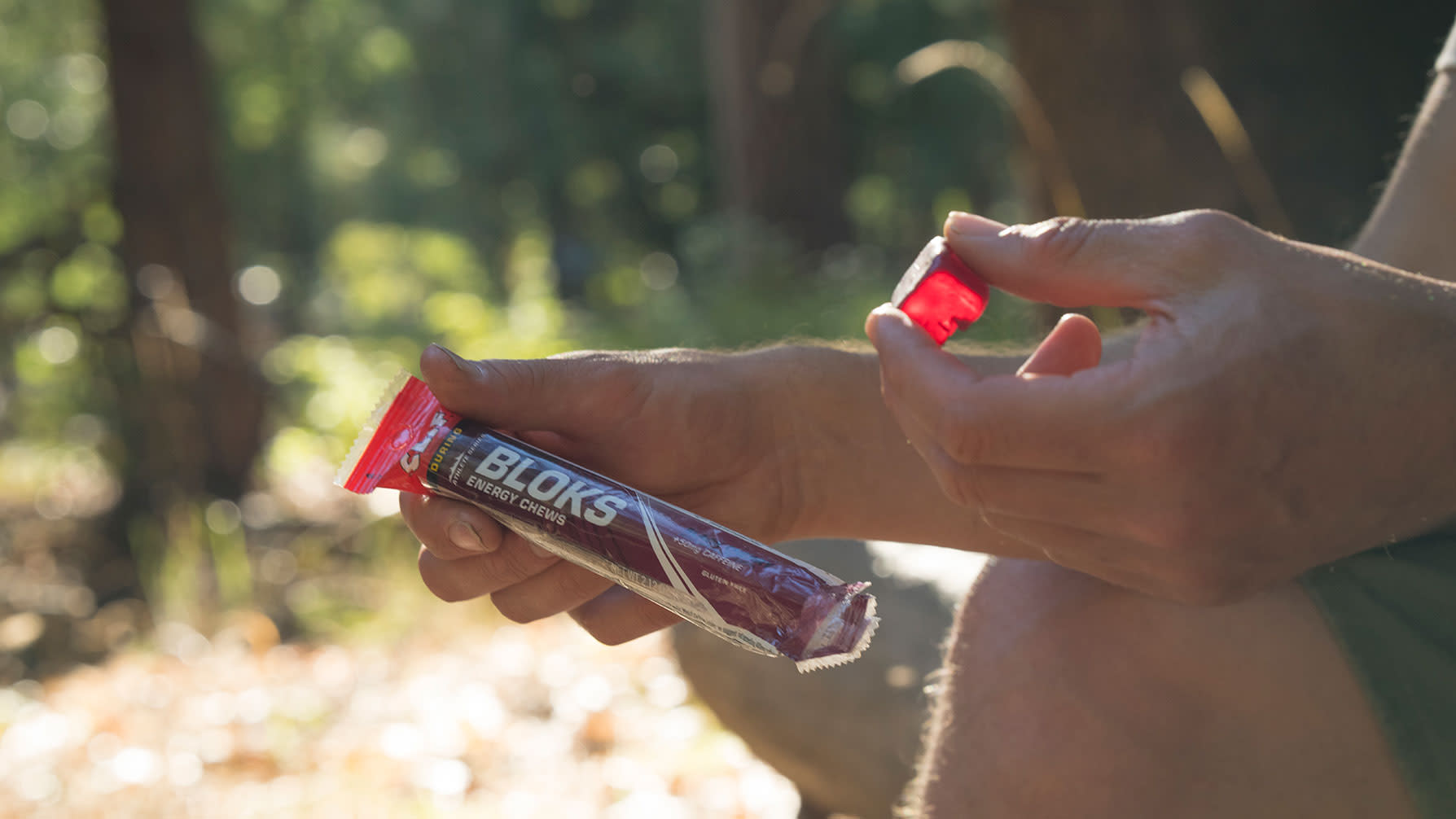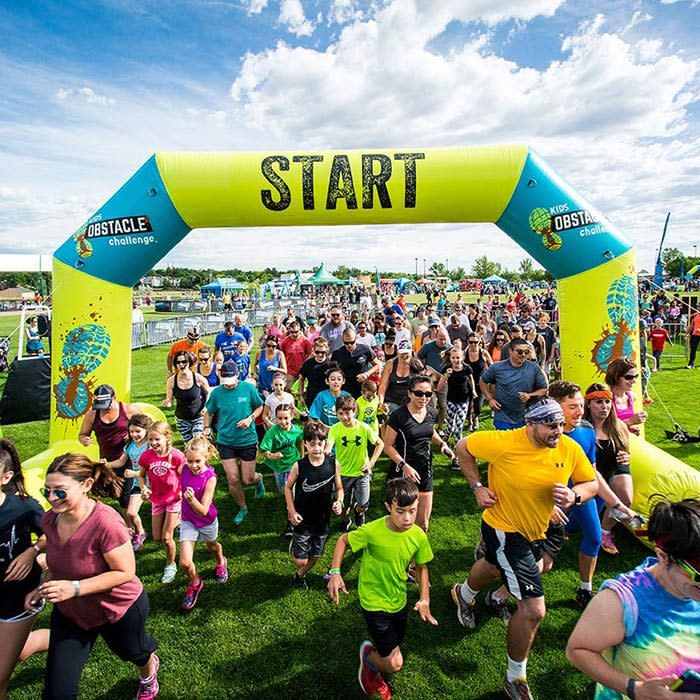The ideas and suggestions written below are provided for general educational purposes only and should not be construed as medical advice or care. Always seek the advice of a physician or other qualified health provider before beginning any physical fitness or health- and nutrition-related activity.
It may seem like common sense that fueling up before a run will contribute to a faster, longer and more pleasant experience. But, because 30-50% of runners suffer from some form of gastrointestinal (GI) upset during a run1, many choose to forego eating altogether, while others may under fuel.
Depending on the individual, runners can need as much as 105 grams of carbohydrates per hour2. It’s vital to eat carbohydrates pre-run to help your body prepare for this need and to avoid distractions like hunger and early fatigue.
So, what should you eat before your run? While the answer is highly individualized based on our physiological differences, food tolerances, and personal preferences, below you will find science-backed guidance to help you prepare for your next run and perform at your best.
What Not to Eat Before a Run
Before we get into what you should eat, let’s cover what not to eat. Whether you’re heading to the starting line for a marathon or hitting the trail for a 5-mile run, eating the wrong foods beforehand can derail performance. Now, no two bodies are the same. We all tolerate various foods differently. So, it’s crucial to pay attention to what foods, spices, and ingredients make your stomach uneasy during training so you can avoid these come race day.
Experts suggest avoiding foods high in fiber, fat, and protein several hours before a run. While these three nutrients are crucial at meals and snacks throughout the day, they slow down digestion and absorption of carbohydrates (which is key to energizing performance).
Also, during endurance exercise (e.g., running) these nutrients can result in reduced stomach emptying.3 That means that not only will it take carbohydrates longer to get from your stomach to your bloodstream and muscles, but it also increases the chance of cramping, bloating and discomfort during your run.
Foods to Avoid Within 3 Hours of a Run
High-fiber legumes, like beans and lentils
High-fiber vegetables, such as asparagus, brussel sprouts, broccoli, etc.
Foods high in saturated fat, including bacon, beef, cheese, fried foods, etc.
Fruit high in fructose, such as apples and pears
Any foods that have caused even mild GI discomfort for you in the past
Nutrition Demands of Your Run
While pre-workout fuel depends on the length of your run, consuming an overall diet low in calories and carbohydrates will undoubtedly impair performance4,5 regardless of what you eat before you start moving.
Total energy and carbohydrate needs vary based on an individual’s weight, training regimen and fitness level, but they typically range from 6-12 grams of carbohydrates per kilogram of body weight (g/kg) during the 24 hours before exercise.6
If you’re unsure about whether you’re meeting your needs, check out our Active Nutrition Guide and meet with a sports dietitian to discuss an eating routine that is right for you.
Eating for a Short Run or Sprint
Short, high-intensity runs lasting 30 minutes or less, or sprint workouts with ample rest in between, require less total energy during exercise than longer runs. While the body’s carbohydrates use goes up as exercise intensity increases,7 if you’re eating enough calories and carbohydrates on a daily basis, your muscle carbohydrate (glycogen) stores should be sufficient to get you through these activities.
However, if it’s been awhile since your last meal, a small bite can help prevent the onset of hunger and help maintain your energy levels during the race. Focus on pre-race foods that are high in easily digestible carbohydrates and lower in protein, fat, and fiber.
Fuel Your Run:
Chocolate Chip
$17.5012 BarsCool Mint Chocolate
$17.5012 BarsCrunchy Peanut Butter
$17.5012 BarsPeanut Butter Banana with Dark Chocolate Flavor
$17.5012 Bars

Food Ideas 1-2 Hours Before a Short Run
A slice of toast with hummus
Oatmeal with dried fruit and plant-based milk
Smoothies with yogurt, berries, and 100% fruit juice
Eating for an Easy Run
If your easy run is low intensity and under 30 minutes, you won’t have to pay much attention to perfecting your pre-run fueling - so long as you avoid the no-no foods indicated above. However, it may be beneficial to schedule your normal meals and snacks around your workouts, so you always feel as if you have the energy you need to move.
Eating for a Long Run
For longer runs lasting over 60 minutes, you’ll require more total energy, and therefore should eat a meal 3-4 hours prior to starting exercise, along with a snack closer to race time. Specifically, runners should aim for 1-4 g/kg of carbohydrates about 1-4 hours prior to a long run to obtain adequate energy and endurance benefits.5 The goal of pre-race meals and snacks is to prevent hunger, avoid GI discomfort, increase glycogen stores, and provide glucose to energize your body.5 The meal should be high in carbohydrates and can contain moderate amounts of fat and protein, with low to moderate amounts of fiber. If you consume a full meal 3-4 hours in advance of your run, roughly 3 g/kg of carbohydrates is enough, as you can obtain the remaining 1 g/kg in your snack.
Meal Ideas 3-4 Hours Before a Long Run
Granola served with plant-based milk and topped with nuts, seeds, and banana
Whole wheat pancakes topped with maple syrup, berries, and nut butter
Brown rice bowl with peppers, carrots, and a small grilled chicken breast in a plum sauce
Peanut butter and jelly sandwich with a glass of low-fat milk or soy milk
Closer to race time you’ll want to top off your glycogen energy stores with a high carbohydrate snack. If fueling up 1-2 hours before the run, a CLIF Energy Bar or the snacks recommended for shorter, easier runs are great options. If looking for an energy boost right before the main event, focus on foods containing mainly easily digestible (fast-acting) carbohydrates.

Eating for a Morning Run
If you’re planning to run in the morning, you should consider how your dinner and snacks may impact your performance. Like pre-workout snacks and meals, food eaten the night before a long morning run should be familiar, adequate in carbohydrates and not excessive in fat, protein, or fiber.
After a night of rest and recovery, it is especially important to restore glycogen, as it is depleted during an overnight fast. Unfortunately, there is often not enough time to eat and fully digest a large, carbohydrate-packed meal before an AM run. Luckily experts suggest that this challenge can be overcome!
Research has shown that consuming 30 grams of easily digestible carbohydrates, in the form of food or fluids, up to 5-15 minutes before exercise can benefit performance.5 One serving of CLIF® BLOKS energy chews provides ~24 grams of fast-acting carbohydrates and can be a great option for pre-breakfast runs lasting over an hour. However, if you have a short run planned in the morning, you may want to consider skipping pre-workout fuel to avoid the chance of GI distress.1
If you have the time for breakfast before your AM run, here is one of my favorite ways to start the day:
Overnight or Microwave Oats:
Ingredients:
Quick oats
Dairy or non-dairy milk
Chia seeds
Maple syrup or honey
Berries or dried fruit
Nut butter
Preparation:
Overnight Oats: Mix all ingredients in a container and let it sit in the refrigerator overnight.
Microwave Oats:
Mix milk, oats, and seeds in a bowl and microwave for 1 minute
Stir and microwave another 30 seconds until desired consistency is reached
Add sweetener, fruit, and nut butter to taste
Takeaway Tips
Nutrition for training and racing is highly individualized. The meal and snack suggestions in this article are examples that have worked well for some runners I’ve worked with in my practice. With that said, just because a meal benefits one runner, it doesn’t mean it will work for all! Use trial and error, and don’t let one reaction to one meal or snack prevent you from eating before your runs altogether. With a little effort and time, you can find the foods and eating routine that can help optimize your training and performance!
References
Oliveira E, Burini R, Jeukendrup A. Gastrointestinal Complaints During Exercise: Prevalence, Etiology, and Nutritional Recommendations. Sports Med, 2014. 44(1);79-85.
Jeukendrup A. The new carbohydrate intake recommendations. Nestle Nutr Inst Workshop Ser. 2013;75:63–71.
Jeukendrup A. Training the Gut for Athletes. Sports Med, 2017. 47(1); 101-110.
Jeukendrup, A. E. Nutrition for endurance sports: marathon, triathlon, and road cycling." J Sports Sci 29 Suppl 1: S91-99, 2011.
Karpinski C, Rosenbloom C. Sports Nutrition: A Handbook for Professionals, 6th Edition. Academy of Nutrition and Dietetics, 2017. Pages
Beck K et al. ROle of Nutrition in Performance Enhancement and Postexercise Recovery. Sports Med, 2015. 6:259-267.














